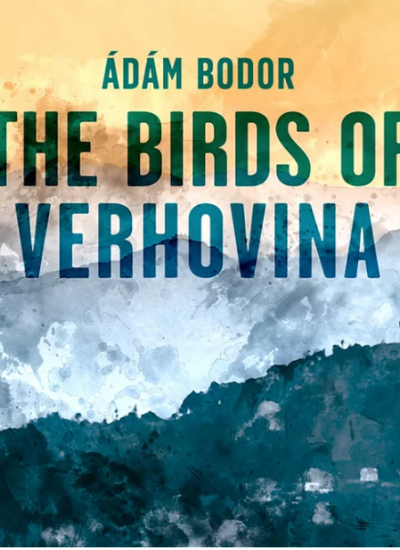The Birds of Verhovina

Home to nine hot springs, Verhovina used to be rich in natural beauty, yet it has become a wasteland, with only a few dozen inhabitants left. Trains to Verhovina are scarce; the timetable was cancelled. One day, even the birds disappeared from the region. The village has virtually lost contact with the outside world, though it seems to depend on some faceless, invisible power whose arrival always spells mysterious disappearance and violent death. The reader arrives in Ádám Bodor’s world, on the periphery of civilization, at the break of dawn. Adam, the foster son of Brigadier Anatol Korkodus is waiting at the dilapidated station for a boy who is arriving from a reformatory school. Soon afterwards, Korkodus is arrested, for unfathomable reasons. As the subtitle says, these stories are ‘variations on the last days.’ Yet this decaying and sinister world, populated with people bearing fantastic names (Bodor’s trademark), is not devoid of a certain joie de vivre: people eat gourmet dishes, point out their interlocutor’s hidden motives with incredible acumen, and enjoy the stunning natural beauty. Ádám Bodor’s novel is the description of a totalitarian society in all its irrationality, absurdity, and implacability – a description that alternately provokes laughter and shuddering in the reader.
The Birds of Verhovina is oppressive and cruel without ever being gratuitously so; hilariously funny without being silly; magic and surreal without being gaudy or bombastic.
ÁDÁM BODOR, born 22 February 1936 in Cluj, is an author of Transylvanian Hungarian origin and one of Hungary’s most revered writers. Bodor has won many literary prizes, including the Literature Prize of the Hungarian Arts Foundation (1996), the Sándor Márai Literature Prize for works published in Hungary and Abroad (1996), the Pr Literatura Prize of the National Association of Creative Artists (1996), Hungary’s Golden Wreath (1998), the Kossuth Prize (2003) (Hungary’s top award for writers), and the Artist of the Nation Award (2019).
His first book (The Witness) was published in 1969 in Romania, while in Hungary his debut piece was a collection of short stories entitled A High Mountain Pass (1980). He has been living in Hungary since the early 1980s; for a time, he was editor at Magvető Publishing House. In the 1990s, he became familiar to the wider reading public after the publication of his novels Sinistra Zone (1992), The Visit of the Archbishop (1999), and the most comprehensive collection of his short stories to date, Back to the Long-eared Owl (1997), as well as a confessional, autobiographical piece which was eventually given an interview form (The Smell of Prison, 2000). Bodor’s books have been published in more than twenty languages. Several of his works were made into films, including Zoltán Kamondi’s Dolina, based on The Visit of the Archbishop.
Bodor’s work in English translation includes The Sinistra Zone (2013, translated by Paul Olchváry). The Birds of Verhovina, translated by Peter Sherwood, will be his second book published in English.